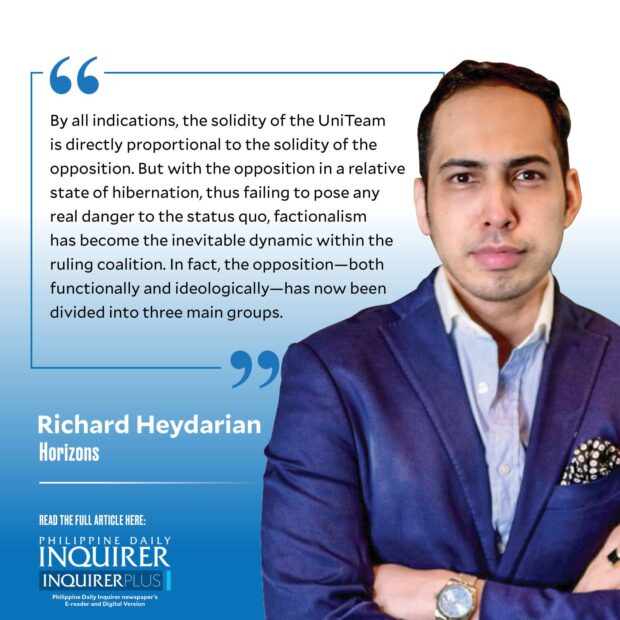After UniTeam: A new opposition?
 The past week or two were particularly eventful for the Marcos-Duterte UniTeam axis. Former president Rodrigo Duterte, who once again skipped his successor’s most important annual speech, dropped by Malacañang. Far from a low-key meeting, a full ensemble of Duterte administration stalwarts were also in attendance, especially those who had accompanied the former president during a controversial trip to China.
The past week or two were particularly eventful for the Marcos-Duterte UniTeam axis. Former president Rodrigo Duterte, who once again skipped his successor’s most important annual speech, dropped by Malacañang. Far from a low-key meeting, a full ensemble of Duterte administration stalwarts were also in attendance, especially those who had accompanied the former president during a controversial trip to China.
True to his conflict-averse nature, President Marcos constantly played nice, dismissing any suggestion of schism or policy divisions with the former president. “As long as there will be someone who can help. I am sure that he will be able to tell us what happened during their conversation and see how that affects us,” Mr. Marcos said of his predecessor’s surprise visit to Beijing, which was apparently not coordinated with the Department of Foreign Affairs at all.
Mr. Marcos generously portrayed Duterte’s latest antics as a constructive form of backdoor diplomacy. He was fully attentive and seemingly deferential during his meeting with Duterte. Duterte reportedly “gave some good pieces of advice to President Marcos.” No details of the conversation were provided, but it’s easy to guess its core content: the former president, a most “special friend” of China, asking his successor to reconsider the expanded Enhanced Defense Cooperation Agreement (Edca) with the United States.
The Duterte-Marcos meeting came not long after Vice President Sara Duterte was seen arm in arm with Speaker Martin Romualdez, both with beaming smiles, as they sent off Mr. Marcos to yet another foreign trip. The intended message of the abovementioned events is crystal clear. But upon closer examination, the Marcos administration has some fundamental policy differences with the Dutertes, most notably on the foreign policy front.
As Defense Secretary Gilbert Teodoro made it clear not long after the Marcos-Duterte meeting in Malacañang: “Edca, first and foremost, is Philippine base. … [I]t is our business what we do here just as long as it is for Philippine interest, and here, the United States and we converge in our intended use for this, and it is not any other countries’ business to question what we do here.”
Differences over foreign policy are just the tip of the iceberg, with Mr. Marcos also striking a different tone on a whole host of domestic issues that stood at the heart of the Dutertismo project. And this, dear reader, brings us to the topic of the opposition.
By all indications, the solidity of the UniTeam is directly proportional to the solidity of the opposition. But with the opposition in a relative state of hibernation, thus failing to pose any real danger to the status quo, factionalism has become the inevitable dynamic within the ruling coalition.
In fact, the opposition—both functionally and ideologically—has now been divided into three main groups. There is, of course, the “Never Marcos” camp, which has been busy highlighting all the obvious shortcomings and vulnerabilities of the incumbent, while conveniently overlooking the true roots of its own weaknesses and political marginalization.
And then, there is the “Never Duterte” camp, which has warmly welcomed Mr. Marcos’ sensible policy recalibrations, most notably the end of populist attacks on big businesses, the end of slavish kowtowing to the bully in the West Philippine Sea, and the drawdown of the violent drug war. Many members of this camp have either joined the administration as appointees/advisers or serve as its (unwitting) impresarios. Their ultimate goal is preventing the return of the Dutertes to Malacañang, and they see fiery Sen. Rafael “Raffy” Tulfo as a potential rallying point for the 2028 elections.
There is a third camp, however. Slowly, but surely, a new opposition camp is crystalizing around a whole host of energetic and progressive leaders, especially at the local government level. Instead of partisanship, or obsession with virtue signaling or electoral appeal, the new opposition is drawing inspiration from the good governance track record of classically centrist political leaders such as Baguio City Mayor Benjamin Magalong.
In fact, the star leader from the country’s summer capital is set to launch a “mayors for good governance” movement later this month in tandem with Quezon City Mayor Josefina “Joy” Belmonte and dozens of other progressive leaders. Should the three camps form an umbrella coalition in coming years, they will be a force to reckon with.
—————–
rheydarian@inquirer.com.ph




















